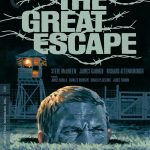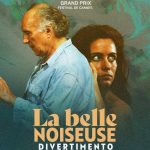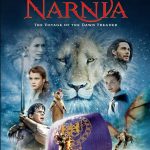Shrek (2001)
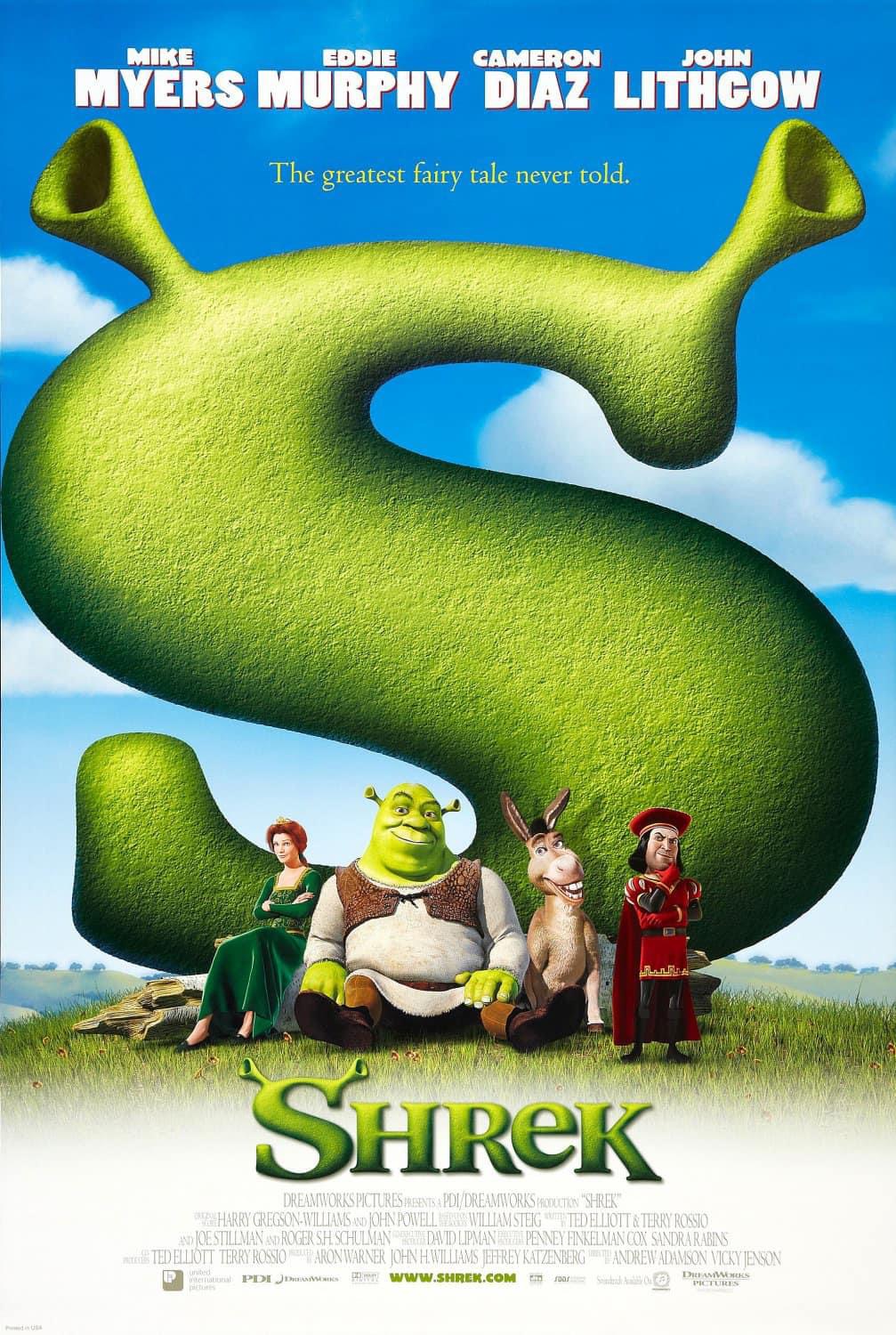
DreamWorks Animation’s Shrek (2001), directed by Andrew Adamson and Vicky Jenson, is a groundbreaking animated film that redefined the fairy tale genre. With its irreverent humor, subversive take on classic tropes, and heartfelt story, Shrek became an instant classic and a cultural phenomenon. Featuring memorable characters, a witty script, and stunning animation, the film remains a touchstone of animated cinema.
Suggested videos for you:
Plot Overview
The film opens in a mythical kingdom where Shrek (voiced by Mike Myers), a grumpy, reclusive ogre, lives happily alone in his swamp. His peace is disrupted when Lord Farquaad (John Lithgow), a tyrannical ruler, exiles fairy tale creatures to Shrek’s swamp. Determined to reclaim his solitude, Shrek agrees to rescue Princess Fiona (Cameron Diaz) for Farquaad in exchange for getting his land back.
Joined by Donkey (Eddie Murphy), Shrek embarks on a journey filled with humor, danger, and surprising revelations. Along the way, Shrek and Fiona develop a connection, but Fiona hides a secret—she transforms into an ogre at night due to a curse. Ultimately, Shrek learns to embrace his identity, and Fiona discovers that true love isn’t about appearances.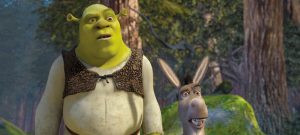
Themes and Emotional Depth
At its core, Shrek is a story about self-acceptance and breaking stereotypes. Shrek’s journey is not just physical but emotional, as he learns to let others into his life and accept that he is worthy of love. Fiona’s arc complements this theme, challenging the notion of conventional beauty and redefining the fairy tale “happily ever after.”
The film also explores themes of friendship, individuality, and challenging societal norms. It pokes fun at the traditional fairy tale formula, turning clichés on their heads while delivering a sincere message about being true to oneself.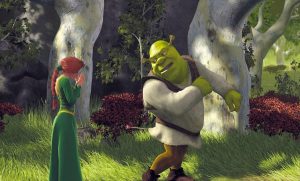
Characters and Performances
1.Shrek (Mike Myers): Myers brings a distinct charm to Shrek, with his Scottish accent and dry humor giving the character a relatable and endearing quality.
2.Donkey (Eddie Murphy): Murphy’s energetic and comedic performance as Donkey steals the show. His banter with Shrek and his infectious optimism provide much of the film’s humor.
3.Princess Fiona (Cameron Diaz): Diaz balances Fiona’s independence, vulnerability, and humor, making her a multi-dimensional and empowering character.
4.Lord Farquaad (John Lithgow): Lithgow’s pompous and self-absorbed Farquaad is a hilariously over-the-top villain, whose ridiculousness adds to the film’s satirical tone.
Animation and Visuals
For its time, Shrek was a technical marvel. DreamWorks utilized cutting-edge CGI to create a lush and immersive fantasy world filled with vibrant characters and detailed landscapes. From the swamp’s muddy textures to the grandeur of Farquaad’s castle, the film’s visuals were a significant leap forward in animation.
The character designs are distinct and memorable, especially Shrek’s bulky yet expressive appearance and Fiona’s dual human-ogre form. The animators also infused the film with clever visual gags, adding to its comedic appeal.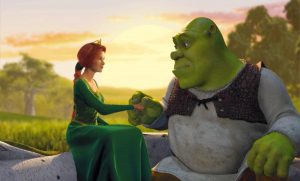
Humor and Satire
One of Shrek’s defining features is its irreverent humor. The film parodies classic fairy tales, poking fun at their tropes while simultaneously honoring the genre’s heart. From the Disney-esque Duloc theme park to Donkey’s rapid-fire one-liners, the humor appeals to both children and adults.
The pop-culture references, while dated in some cases, add a layer of wit that keeps the film engaging for older audiences.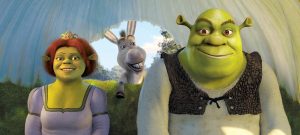
Music and Soundtrack
The film’s eclectic soundtrack is another standout element, blending pop hits with original compositions to great effect. Smash Mouth’s “All Star” and “I’m a Believer” bookend the movie with upbeat energy, while Rufus Wainwright’s “Hallelujah” adds emotional depth to a pivotal moment. The music enhances the film’s tone, complementing its mix of humor and heart.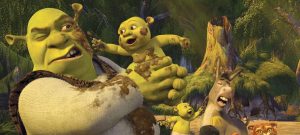
Criticisms
While Shrek is widely beloved, some critics have noted that its reliance on pop-culture references may date the film for modern audiences. Additionally, the humor, while clever, occasionally veers into crude territory, which might not appeal to all viewers.
Legacy and Impact
Shrek was a critical and commercial success, grossing over $480 million worldwide and winning the first-ever Academy Award for Best Animated Feature. It spawned a franchise of sequels, spin-offs (such as Puss in Boots), and a Broadway musical. The film’s impact on animation is profound, as it demonstrated that animated movies could subvert expectations while still delivering heartfelt stories.
Conclusion
Shrek is a rare gem that combines humor, heart, and innovation to create a film that stands the test of time. With its lovable characters, sharp wit, and meaningful themes, it continues to captivate audiences and inspire future storytellers. Whether you’re drawn to its hilarious satire or its uplifting message of self-acceptance, Shrek is a timeless celebration of individuality and the power of true love.
Shrek (2001): A Hilarious and Heartfelt Fairy Tale Revolution
DreamWorks Animation’s Shrek (2001), directed by Andrew Adamson and Vicky Jenson, is a groundbreaking animated film that redefined the fairy tale genre. With its irreverent humor, subversive take on classic tropes, and heartfelt story, Shrek became an instant classic and a cultural phenomenon. Featuring memorable characters, a witty script, and stunning animation, the film remains a touchstone of animated cinema.
Plot Overview
The film opens in a mythical kingdom where Shrek (voiced by Mike Myers), a grumpy, reclusive ogre, lives happily alone in his swamp. His peace is disrupted when Lord Farquaad (John Lithgow), a tyrannical ruler, exiles fairy tale creatures to Shrek’s swamp. Determined to reclaim his solitude, Shrek agrees to rescue Princess Fiona (Cameron Diaz) for Farquaad in exchange for getting his land back.
Joined by Donkey (Eddie Murphy), Shrek embarks on a journey filled with humor, danger, and surprising revelations. Along the way, Shrek and Fiona develop a connection, but Fiona hides a secret—she transforms into an ogre at night due to a curse. Ultimately, Shrek learns to embrace his identity, and Fiona discovers that true love isn’t about appearances.
Themes and Emotional Depth
At its core, Shrek is a story about self-acceptance and breaking stereotypes. Shrek’s journey is not just physical but emotional, as he learns to let others into his life and accept that he is worthy of love. Fiona’s arc complements this theme, challenging the notion of conventional beauty and redefining the fairy tale “happily ever after.”
The film also explores themes of friendship, individuality, and challenging societal norms. It pokes fun at the traditional fairy tale formula, turning clichés on their heads while delivering a sincere message about being true to oneself.
Characters and Performances
1.Shrek (Mike Myers): Myers brings a distinct charm to Shrek, with his Scottish accent and dry humor giving the character a relatable and endearing quality.
2.Donkey (Eddie Murphy): Murphy’s energetic and comedic performance as Donkey steals the show. His banter with Shrek and his infectious optimism provide much of the film’s humor.
3.Princess Fiona (Cameron Diaz): Diaz balances Fiona’s independence, vulnerability, and humor, making her a multi-dimensional and empowering character.
4.Lord Farquaad (John Lithgow): Lithgow’s pompous and self-absorbed Farquaad is a hilariously over-the-top villain, whose ridiculousness adds to the film’s satirical tone.
Animation and Visuals
For its time, Shrek was a technical marvel. DreamWorks utilized cutting-edge CGI to create a lush and immersive fantasy world filled with vibrant characters and detailed landscapes. From the swamp’s muddy textures to the grandeur of Farquaad’s castle, the film’s visuals were a significant leap forward in animation.
The character designs are distinct and memorable, especially Shrek’s bulky yet expressive appearance and Fiona’s dual human-ogre form. The animators also infused the film with clever visual gags, adding to its comedic appeal.
Humor and Satire
One of Shrek’s defining features is its irreverent humor. The film parodies classic fairy tales, poking fun at their tropes while simultaneously honoring the genre’s heart. From the Disney-esque Duloc theme park to Donkey’s rapid-fire one-liners, the humor appeals to both children and adults.
The pop-culture references, while dated in some cases, add a layer of wit that keeps the film engaging for older audiences.
Music and Soundtrack
The film’s eclectic soundtrack is another standout element, blending pop hits with original compositions to great effect. Smash Mouth’s “All Star” and “I’m a Believer” bookend the movie with upbeat energy, while Rufus Wainwright’s “Hallelujah” adds emotional depth to a pivotal moment. The music enhances the film’s tone, complementing its mix of humor and heart.
Strengths
1.Subversive Storytelling:Shrek flips fairy tale conventions on their head, creating a fresh and engaging narrative.
2.Memorable Characters: The dynamic between Shrek, Donkey, and Fiona drives the story and provides emotional resonance.
3.Universal Appeal: The film balances humor and heart, appealing to both kids and adults.
4.Cultural Impact: Its unique blend of satire and sincerity revolutionized animated films, paving the way for more unconventional storytelling.
Criticisms
While Shrek is widely beloved, some critics have noted that its reliance on pop-culture references may date the film for modern audiences. Additionally, the humor, while clever, occasionally veers into crude territory, which might not appeal to all viewers.
Legacy and Impact
Shrek was a critical and commercial success, grossing over $480 million worldwide and winning the first-ever Academy Award for Best Animated Feature. It spawned a franchise of sequels, spin-offs (such as Puss in Boots), and a Broadway musical. The film’s impact on animation is profound, as it demonstrated that animated movies could subvert expectations while still delivering heartfelt stories.
Conclusion
Shrek is a rare gem that combines humor, heart, and innovation to create a film that stands the test of time. With its lovable characters, sharp wit, and meaningful themes, it continues to captivate audiences and inspire future storytellers. Whether you’re drawn to its hilarious satire or its uplifting message of self-acceptance, Shrek is a timeless celebration of individuality and the power of true love.




